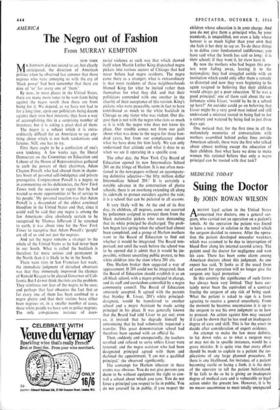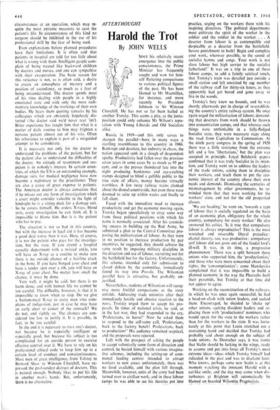Suing the Doctor
MEDICINE TODAY
By JOHN ROWAN WILSON
In this country the significance of such forms has always been very limited. They have cer- tainly never been the equivalent of a contract freeing the surgeon of any risk of being sued. What the patient is asked to sign is a form agreeing to receive a general anaesthetic. From the moment he becomes unconscious it is up to the surgeon to use his own judgment as to how to proceed. An action against him may succeed if it can be shown that he has used an inadequate degree of care and skill. This is for the court to decide after consideration of expert evidence.
An attempt to make the law more definite, to lay down rules as to what a surgeon may or may not do in specific instances, would be a grave mistake. It is quite true that every effort should be made to explain to a patient the im- plications of any large planned procedure. If there is any likelihood, for instance, of a patient becoming sterile or losing a limb, it is the duty of the operator to tell the patient beforehand. If he fails to do so he is giving an inadequate degree of medical care and is vulnerable to legal action under the present law. However, it is by no means uncommon to meet totally unexpected
circumstances at an operation, which may re- quire the most extreme measures to save the patient's life. In circumstances of this kind no surgeon should be inhibited in the use of his professional skill by the fear of being sued.
Even explanations before planned procedures have their limitations. It is often said that patients in hospital are told far too little about what is wrong with them. Intelligent people com- plain of being treated like backward children by doctors and nurses, and one can sympathise with their exasperation. The basic reason for this reticence is not, as is often said, a desire to create an atmosphere of mystery and a position of ascendancy, so much as a fear of being misunderstood. The doctor spends most of his time dealing with people in a highly emotional state and with only the most rudi- mentary knowledge of the workings of their own bodies. He hears them quoting remarks by his colleagues which are obviously hopelessly dis- torted (the doctor said we'd never rear 'im'). Bitter experience has taught him that what is a matter of daily routine to him may frighten a nervous patient almost out of his wits. Often his reluctance to explain is part of a misguided attempt to be considerate.
It is necessary not only for the doctor to understand the problems of the patient, but for the patient also to understand the difficulties of the doctor. An attitude of resentment and sus- picion is in nobody's interest. In certain coun- tries, of which the US is an outstanding example, damage suits for medical negligence have now become a nightmare to the practitioner. They are also a cause of great expense to patients. The American doctor is always conscious that if he misses out any form of investigation which a court might consider valuable in the light of hindsight he is a sitting duck for a damage suit. So he covers himself. He orders X-rays, blood tests, every investigation he can think of. It is impossible to blame him. But it is the patient who has to pay.
The situation is not so bad in this country, but with the increase in legal aid it has become a good deal worse than it was. Here, of course, it is not the patient who pays for the investiga- tion, but the state. If you attend a hospital casualty department with a twisted ankle, you will have an X-ray as a routine to make sure there is no outside chance of a hairline crack in the bone. If you have banged your chest and have a tender spot over a rib, you will have an X-ray of your chest. No matter how small the chance, it must be done.
Very well, it might be said, but there is no harm done, and with human life we cannot be too careful. The difficulty, however, is that it is impossible to know when to stop. Do we give a barium-meal X-ray to every man who com- plains of indigestion, just in case he may have an early ulcer or cancer of the stomach? We do not, and rightly so. The chances are con- sidered too low to justify it. It is possible, in fact, to be too careful.
In the end it is necessary to trust one's doctor, not because he is especially intelligent or especially good, but because his subject is too complicated for an outside person to exercise effective control over it. We have to rely on his professional ethical code to keep him up to a certain level of conduct and conscientiousness. Most men of great intelligence, from Tolstoy to Bernard Shaw to Winston Churchill, have ex- pressed the profoundest distrust of doctors. This is natural enough. Nobody likes to put his life in another man's hands. But, unfortunately, there is no alternative.



































 Previous page
Previous page